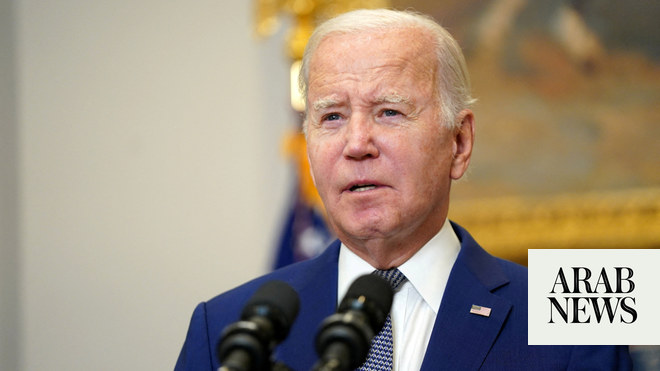
The US Senate on Tuesday was preparing to give final approval to a $95bn in wartime aid for Ukraine, Israel and Taiwan, with a bipartisan coalition eager to send the long-stalled package to Joe Biden’s desk for signature.
In a sweeping 80-19 vote, the Senate overwhelmingly voted to advance the measure in a step hailed by the Senate majority leader as “one of the greatest achievements the Senate has faced in years”.
“Today the Senate sends a unified message to the entire world: America will always defend democracy in its hour of need,” said Chuck Schumer in a floor speech moments after the Senate moved toward final passage of the bill, possibly as early as Tuesday evening.
“Make no mistake, America will deliver on its promise to act like a leader on the world stage, to hold the line against autocratic thugs like Vladimir Putin,” he continued. “We are showing Putin that betting against America is always, always a grave mistake.”
After months of delays and setbacks, the House last week approved four bills to rush funding to three American allies while approving a conservative proposal that could lead to a nationwide ban of the social media platform TikTok. The measures were combined into one large package that the Senate will take up on Tuesday.
The legislation includes $60.8bn to replenish Ukraine’s war chest as it seeks to repel Russia from its territory; $26.3bn for Israel and humanitarian relief for civilians in conflict zones, including Gaza; and $8.1bn for the Indo-Pacific region to bolster its defenses against China.
In a call on Monday, Biden informed the Ukrainian president, Volodymyr Zelenskiy, that he would “move quickly” to send desperately needed military aid, including air defense weaponry, to the country following the bill’s passage by the Senate.
In a move to bolster Republican support, the GOP-controlled House added a provision that would see TikTok blocked in the US unless its Chinese-owned parent company divests from the social media platform within a year. Much of the foreign aid section of the bill mirrors what the Senate passed in February, with the addition of a measure mandating the president seek repayment from Kyiv for roughly $10bn in economic assistance in the form of “forgivable loans”, an idea first floated by Donald Trump, who was initially opposed to aiding Ukraine.
A vast majority of senators was expected to support the package on final passage. In the test vote earlier on Tuesday, 17 hardline Republican senators opposed moving forward with the measure. Among them was Rick Scott, the Florida senator, who said he supported several provisions in the bill, including the TikTok ban and aid for Israel, but could not endorse sending billions of US taxpayer dollars to Ukraine.
Two progressive senators, Democrat Jeff Merkley and independent Bernie Sanders, voted against the procedural rule, saying they could not support providing additional military aid to Israel at a time when its government is waging a war that has killed more than 34,000 Palestinians in Gaza and pushed the territory to the brink of famine.
“We are now in the absurd situation where Israel is using US military assistance to block the delivery of US humanitarian aid to Palestinians,” Sanders said in remarks on the Senate floor. “If that is not crazy, I don’t know what is.”
The Vermont senator sought to introduce two amendments: one that would end offensive military funding to Israel, citing Americans’ “increasing disgust” for Benjamin Netanyahu’s “war machine”, and another to restore funding to the UN relief agency Unrwa. Both were blocked from consideration, a move he denounced as a “dark day for democracy”.
The foreign aid package largely resembles the measure passed by the Senate in February. But several Republican senators who voted against it then reversed course and on Tuesday gave their approval.
Among them was Lindsey Graham, a longtime defense hawk who previously opposed the Senate’s foreign aid package because it wasn’t paired with border legislation but on Tuesday voted to advance it. Following a visit to Ukraine earlier this year, Graham endorsed Trump’s loan plan and has since pointed to Iran’s aerial attack on Israel as a reason send aid to the country.
“Israel needs the US Senate now. No excuses,” Graham wrote on X before voting to advance the bill.
The Senate’s passage of the aid package caps a tortured odyssey on Capitol Hill that began last year with a request for the White House for a fresh round of funding for Ukraine and for Israel, reeling from the 7 October cross-border attack by Hamas.
Despite broad congressional support, the effort almost immediately stalled as a faction of Republicans, increasingly skeptical of US involvement in foreign entanglements, resisted sending more aid to Ukraine. Conservatives began insisting that any funding to foreign countries be paired with legislation aimed at stemming the rise of people arriving at the US-Mexico border.
When a bipartisan border and national security bill negotiated in the Senate collapsed, Schumer proceeded to move forward with a vote on the foreign aid bill up for a vote. It passed overwhelmingly in a 70-29 vote in February, but had no clear path forward in the Republican-controlled House, where the new speaker, Mike Johnson, dithered as Ukraine suffered battlefield losses.
Personal entreaties from Biden, congressional leaders and European heads of state, participation in high-level intelligence briefings as House speaker, and prayer eventually persuaded Johnson to act. The decision may come at a political cost: his job.
“History judges us for what we do,” Johnson said at an emotional press conference last week, after a bipartisan coalition of lawmakers passed the aid package by lopsided margins.
In remarks on Tuesday, Schumer praised Johnson, who he said “rose to the occasion”, as well as Mitch McConnell, the Republican Senate leader with whom the Democrat said he had worked “hand in hand and shoulder to shoulder to get this bill done”.
“A lot of people inside and outside the Congress wanted this package to fail,” Schumer said. “But today those in Congress who stand on the side of democracy are winning the day.”
McConnell has made funding Ukraine’s war effort a legacy-building quest, after announcing his decision to step down as the long-serving Senate Republican leader. In a lengthy floor speech ahead of the procedural vote on Tuesday, McConnell confronted the strain of “America first” isolationism favored by Trump and his loyalists in Congress that is rife and growing within the Republican party.
“Today’s action is overdue, but our work does not end here,” he said. “Trust in American resolve is not rebuilt overnight. Expanding and restocking the arsenal of democracy doesn’t just happen by magic.”












